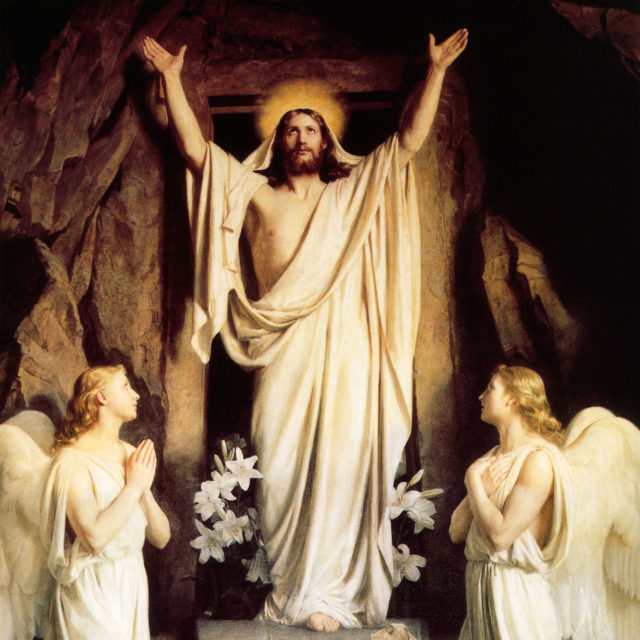Christ is risen! As Catholics, Easter marks the highest point in the liturgical year and is cause for the greatest rejoicing and celebration. The Resurrection of Our Lord is the source of our joy and the foundation of our hope and faith as His disciples. Among the rich liturgical treasures of Eastertide is the joyful antiphon proclaimed in the liturgies and devotions of the Church, the Regina Caeli (Queen of Heaven).
The Regina Caeli is one of four Marian antiphons of Catholic tradition. An antiphon is a short liturgical text chanted or sung responsively preceding or following a psalm, psalm verse, or canticle. Antiphons are traditionally said or sung after night prayer, immediately before going to sleep. The Regina Caeli is prayed throughout Eastertide (from Easter Sunday through Pentecost, the seventh Sunday after Easter).
In this lesson, students will hear a beautiful musical setting of the Regina Caeli, written by the Spanish composer, Tomás Luis de Victoria (ca. 1548–1611). They will then reflect on their experience of it, and discuss how the musical setting of this prayer helps to affirm, celebrate, or illuminate our Holy Catholic Faith.
The Call of Beauty: Regina Caeli
Insert Liturgical Connection Title Here

This lesson is for:
Tagged as
Lesson Overview
Lesson Materials
A. Begin by proclaiming to your class the Easter proclamation, “Christ is risen!” Explain that as Catholics, Easter marks the highest point in our liturgical year, and is cause for the greatest rejoicing and celebration, both liturgically and in family life. The remembrance of the Resurrection of Our Lord is the source of our joy and the foundation of our hope and faith as disciples of Christ. By rising again from the dead, as He said He would, Christ defeated death forever. He has conquered the grave, becoming “the firstfruits of those who have fallen asleep” (1 Corinthians 15:20). B. Next, distribute the Warm-Up activity and have your students read the Scripture passages and either silently or in small groups answer the focus and reflection questions. C. When they have finished, call on students or groups to share and discuss their answers as a class. D. Then, explain that in the life of the Church, the celebration of Easter extends beyond a single day, week, or even a month. The joy of Easter is celebrated for a whole season! The liturgical season of Eastertide begins on Easter Sunday and ends on the feast of Pentecost, (the seventh Sunday after Easter). Today, we are going to listen to a beautiful setting of the Easter antiphon, Regina Caeli (Queen of Heaven). An antiphon is a short liturgical text chanted or sung responsively preceding or following a psalm, psalm verse, or canticle. For example, you hear an antiphon at every Mass, during the responsorial Psalm. Antiphons are traditionally said or sung after night prayer, immediately before going to sleep. The Regina Caeli is one of four Marian antiphons of Catholic tradition, prayed throughout Eastertide. It honors Our Lady, and celebrates the glorious Resurrection of Her Son, Jesus! E. Then, have students read both the English and Latin text in the Regina Caeli activity. Have them compare both texts and circle any Latin words that they can recognize in relation to the English translation. Ask students to share the words they recognize. F. Next, create a prayerful atmosphere and play for the class the recording of “Regina Caeli” (you may project the video of the singers, or just have students listen to the recording. Either way, it is recommended that you use external speakers in order for your students to experience the full effects and nuances of the recording). Ask students to follow along with the Latin text to the best of their ability as they listen to the prayer. You may wish to play it more than once. You may also wish to encourage your students to pray along with the recording. G. Have your students answer the reflection questions individually. When they have finished, call on students to share their answers, sharing your own thoughts and reflections on the piece as you work through the questions with them. H. Finally, review and explain that our habits form us, one way or the other. Praying with and reflecting on beautiful sacred music will exercise our capacity for awe, wonder, delight in goodness and truth, and increase our desire, or appetite, for beauty itself. Sacred music gives expression to both our joys and our sorrows as children of God; it gives voice to our penitence and our praise, aids our prayer, and disposes our hearts to experience God’s love and abundant mercy Accept reasoned answers for all.Teacher Directions
Resources
Activities:
Answer Key:
Warm-Up
Regina Caeli by Victoria

